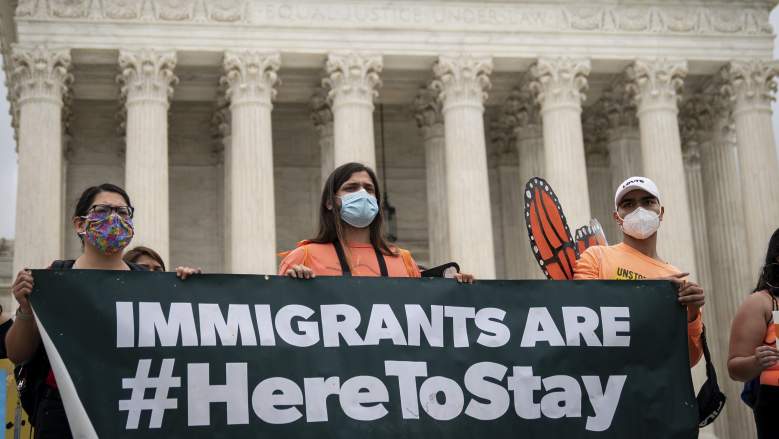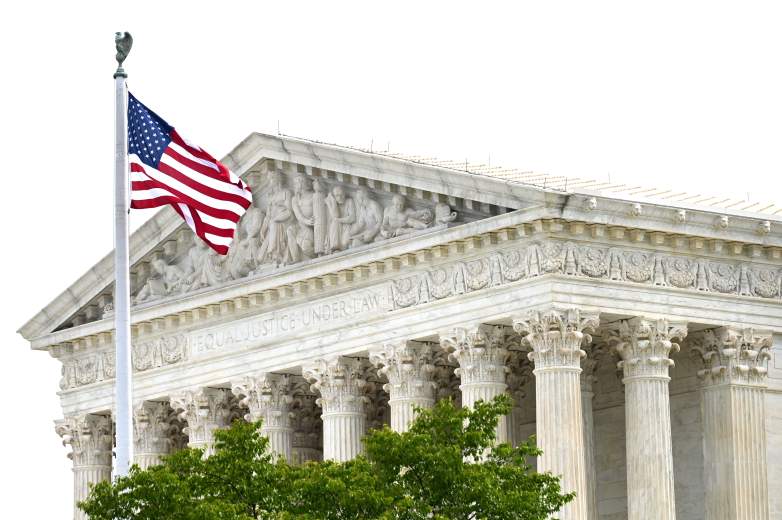
Getty Recipients and their supporters rally outside the U.S. Supreme Court on June 18, 2020 in Washington, DC. On Thursday morning, the Supreme Court, in a 5-4 decision, denied the Trump administration's attempt to end DACA, the Deferred Action for Childhood Arrivals program.
The United States Supreme Court ruled Thursday that the Deferred Action for Childhood Arrivals, or DACA, introduced in 2012 during the Obama administration will be upheld after President Trump moved to end the program in 2017.
The Trump administration challenged the initiative, which “provided temporary, renewable relief from deportation” for kids brought to the U.S. by parents who did not follow the legal channels to enter the country, according to Law.
The measure would allow those children, many of who grew up in the United States, to keep their jobs and continue to apply for work permits without fear of sudden deportation.
According to America’s Society Council of the Americas, recipients are relinquished from the U.S government pursuing their deportation for two years intervals if they meet the criteria to be a recipient. They may apply for the renewal of their DACA status as the second year of protections is closing in order to keep their employment authorization.
Some recipients may be eligible for social security and medicare, as well as possible qualifications to get driver’s licenses and be eligible for in-state tuition costs.
DACA is not a path to citizenship.
According to the ruling, over 700,000 people were at risk of deportation if DACA was discontinued.
Here is who qualifies:
The program applies to childhood arrivals who were under age 31 in 2012; have continuously resided here since 2007; are current students, have completed high school, or are honorably discharged veterans; have not been convicted of any serious crimes; and do not threaten national security or public DHS concluded that individuals who meet these criteria warrant favorable treatment under the immigration laws because they “lacked the intent to violate the law,” are “productive” contributors to our society, and “know only this country as home.
The Coronavirus Pandemic May Have Been Taken Into Account as Part of The Decision Because Many Who Are Eligible for DACA are Health Care Workers

GettyThe US flag flies over the US Supreme Court.
The justices may have come to their 5-4 ruling in favor of keeping those eligible for DACA in part because of a post-argument brief that said if DACA was terminated it could mean losing 27,000 critical health care workers at a time when they are crucial.
Chad Wolf, Acting Secretary of Homeland Security wrote in the argument:
Healthcare providers on the frontlines of our nation’s fight against COVID-19 rely significantly upon DACA recipients to perform essential work. Approximately 27,000 DACA recipients are healthcare workers—including nurses, dentists, pharmacists,physician assistants, home health aides, technicians, and other staff—and nearly 200 are medical students,
residents, and physicians.The country [is not] prepared to fill the loss that would result if DACA recipients were excluded from the health care workforce. The number of physicians in the United States has not kept pace with our growing and aging population and a commensurate increase in patients. . . . These shortages will be felt most keenly in medically underserved areas, such as rural settings and poor neighborhoods –precisely the areas in which DACA recipients are likeliest to work.
President Trump Called the Decision ‘Horrible’ & ‘Politically Charged’
For President Trump, who said he would end DACA as one of his campaign promises, tweeted about SCOTUS’s ruling.
He said, “These horrible & politically charged decisions coming out of the Supreme Court are shotgun blasts into the face of people that are proud to call themselves Republicans or Conservatives. We need more Justices or we will lose our 2nd. Amendment & everything else. Vote Trump 2020!”
Trump also accused the Supreme Court Justices of making decisions based on not liking him.
As part of the decision, Justice Sonyia Sotomayor, who ruled in favor of keeping DACA, points out how Trump referred to undocumented immigrants as criminals, which skews the perception of who DACA would protect, referring to “Trump’s 2017 statement comparing undocumented immigrants to ‘animals’ responsible for ‘the drugs, the gangs, the cartels, the crisis of smuggling and trafficking, [and] MS13.’”
Justice Clarence Thomas, who voted to rescind DACA, wrote, “Now, under the Trump administration, DHS has provided the most compelling reason to rescind DACA: The program was unlawful and would force DHS to continue acting unlawfully if it carried the program forward.”
Ultimately though, Chief Justice Roberts concluded that the acting secretary who motioned to rescind DACA violated the Administrative Procedure Act, and “therefore the rescission must be vacated.”
READ NEXT: Danny Masterson’s Accusers Say Church of Scientology Re-Victimized Them